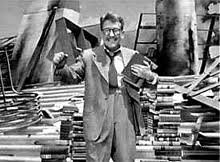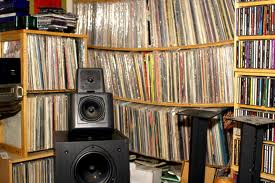Mr. Jazz Lives asks:
When we are able to buy all the recordings of Louis or Django at one expensive shelf-filling gulp, do we listen to them completely? Or are we perversely overawed by the completeness, the profusion?…
I am reminded of my conversation with a musician who is now eighty, who talked about being able to buy one 78 record a week, so it had better be perfect. I am sure that had he, in 1944, been able to visualize the Complete Art Tatum Solo Performances in one package, he would have seen it as a wondrous mirage. How does it make us feel, I wonder. When our wants are gratified, will we be happier?
 When I read this passage, I recalled the perverse sense of gratitude that I felt when I moved to a much smaller apartment a number of years ago and was forced to dispose of roughly two-thirds of my personal library–mostly books, to be sure, though I also pruned my CDs extensively and continue to do so on a regular basis.
When I read this passage, I recalled the perverse sense of gratitude that I felt when I moved to a much smaller apartment a number of years ago and was forced to dispose of roughly two-thirds of my personal library–mostly books, to be sure, though I also pruned my CDs extensively and continue to do so on a regular basis.
Joseph Epstein, who had previously done the same thing, wrote an essay about the experience called “Books Won’t Furnish a Room” that made a powerful impression on me at the time. This is the next-to-last paragraph:
I have almost as little desire to live in a library as I do on a golf course. I seek a compromise: living in a place where not every wall has a bookcase. I hope that by now the book collector’s impulse is dead in me. With luck, I expect always to have the right books to keep my mind engaged, to put me gently to sleep at night, to be on hand to distract me during bouts of insomnia. I’m far from ready to go so far as Philip Larkin and say that “books are a load of crap.” But in selling off my books I felt I was freeing myself in some way, entering another stage in life–though I’m not altogether clear what it might be. Behind my selling all these books was a longing to streamline my life a bit, make it feel less cluttered, encumbered, book bound. In doing so, I feel as if I had gathered my desert-island books about me without actually having to sail off for the island….
It was this piece, which was originally published in 2000, that gave me the courage to shed so many of my books and CDs. Never since have I regretted that hard decision, not even when I find myself briefly wishing that I had a specific book or album close to hand for purposes of research.
 This is even true in the case of the jazz CDs that rank among my greatest treasures. I, too, once felt the mad desire to own every jazz record ever made, and to have them all shelved in chronological order at arm’s length from my desk. Today I own just two racks, and whenever I acquire a new album, I get rid of an old one in order to make room for it. Not only has this imperative made me ruthlessly selective, but it has forced me to reconsider my priorities. Time was when I bought records in order to say that I had them. Now I keep them only because I love them.
This is even true in the case of the jazz CDs that rank among my greatest treasures. I, too, once felt the mad desire to own every jazz record ever made, and to have them all shelved in chronological order at arm’s length from my desk. Today I own just two racks, and whenever I acquire a new album, I get rid of an old one in order to make room for it. Not only has this imperative made me ruthlessly selective, but it has forced me to reconsider my priorities. Time was when I bought records in order to say that I had them. Now I keep them only because I love them.
No doubt the day is almost here when it will be possible for people like me to download the Complete Performances of Everybody to our computers…except that I’m no longer that kind of person. I love Art Tatum, but I don’t want to own every record he ever made. I want to own the ones that matter to me, and let the others go. I want to be able to pull a CD or book from my shelves at random and know that it will please me, just as I hang on my walls only paintings and prints that move me deeply.
Why have I come to feel this way? Because I’m fifty-four. Life, I now know, is short, too short to waste, and the actuarial tables leave no possible doubt that most of mine has passed me by. As a professional critic, it’s my job–my destiny, you might say–to spend a fair amount of time experiencing art that I don’t like. Insofar as possible, though, I don’t propose to waste any more of the days that remain to me consuming bad art than is absolutely necessary. Unless I’m being paid to do so, I won’t even finish reading a book I don’t like, or listening to a record that fails to engage me. I have better things to do, and not nearly enough time in which to do them.
